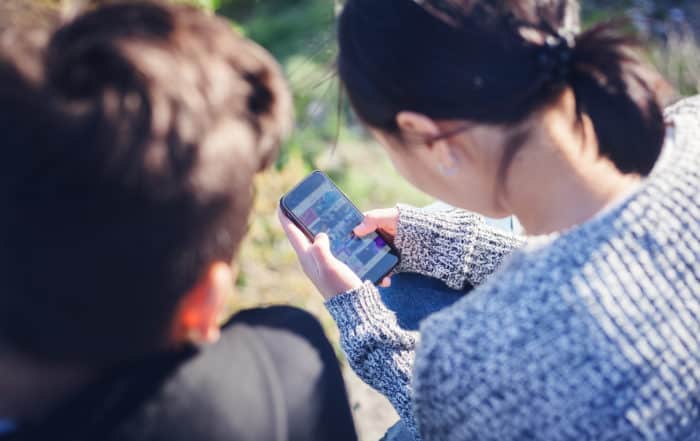Pamela Wisniewski, PhD, presents new research about the online and social media experiences of autistic teens and young adults. Her research findings emphasize teaching teens how to leverage technology to their advantage, stay safe while doing so, and cope with online risks when they are encountered. The presenter asserts that, as parents and educators, it is our job to teach autistic teens online safety skills so they can become well-informed and independent adults. She explains how autistic teens can be disproportionately affected (positively and negatively) by social media experiences, making it important to take evidence-based precautions that protect them from harm without limiting their ability to benefit from what the internet has to offer. The speaker highlights that digital guidelines will vary based on each individual’s needs.
Handouts are online HERE
In this webinar:
0:35 – Fear-based narratives and online safety
3:55 – Finding the middle ground
5:05 – Study 1: Online exposure diary study
7:20 – Quotes from teens
11:00 – Parents’ knowledge
13:49 – Why teens don’t tell
15:25 – End of study findings
16:35 – Study 2: Ethnographic study on risks and benefits of social media use
18:20 – Benefits of social media use for autistic youth
21:30 – How young autistic adults perceive digital affordances
24:40 – Quotes and examples from the study
28:50 – Effects of mediating social media use
32:30 – What can we do?
36:55 – Online safety as a developmental process
38:40 – Guidelines for parental control software/applications
40:35 – Study 3: Parental control application reviews from teens
41:50 – Resist fear-based narratives
42:45 – Acknowledgements and thanks
43:25 – Q & A
Fear-based narratives and the middle ground
Wisniewski describes the fear-based narratives that surround online safety for teens, particularly in the context of autism (0:35). She asserts that fear-based beliefs lead to reactive, fear-based decisions such as limited access or total abstinence from technology. The speaker states that our aim should be to find ways to protect our children while giving them the opportunity to benefit from what the internet can afford them (1:30). Wisniewski shares a personal story about opportunities her daughtered gained through online learning and highlights that access to the internet allows youth and adults to create relationships, learn, build essential communication and social skills, and much more (3:55). These skills will assist youth and young adults to live well-adjusted and independent lives when they grow up (4:50).
Study 1: Online exposure diary study
The presenter outlines a diary study of 68 parents and teens (ages 13 – 17) in a representative sample of both neurodiverse and neurotypical individuals (5:05). She notes that although participants did not disclose autism diagnosis, this study shows that we all face the same struggles, regardless of whether or not our teen is autistic (5:35). The study found that the majority of youth did not intentionally seek out risks and that most risks were medium to low severity (6:08). 47% of teens took active measures to cope with online risk, and almost half of reports were resolved within a week. Many reports also showed that online experiences allowed teens to build important social skills, like boundary setting, problem-solving, and empathy (7:00). These findings, Wisniewski asserts, speak to the intelligence and capability of our teens and the need for support and education for online risks.
Online experiences
Wisniewski states that study findings show clear evidence of the complex and heavy things our youth are seeing online. However, these data should also give hope and a better understanding that youth are intelligent and do know how to protect themselves online (7:20). She reiterates the need for parents and caregivers to readjust and meet young adults where they are and shares a quote:
“A friend of mine was feeling particularly sexual, and it showed in her texts. It’s not like I planned it, but I certainly wasn’t opposed to it (9:45).” – 16 year old male
The presenter understands that this may make parents uncomfortable at first but asks viewers to remember what they were doing and what they were interested in when they were 16. Interest in sexuality is developmentally normal, she continues, but we need to be sure that both youth and parents/caregivers are being healthy about it.
Challenges in parent-teen communication
The study found that teens often perceive parents’ attempts to address online issues as lectures or punishments (12:08). Teens also reported that they didn’t ask parents for help due to concerns about unnecessary awkwardness, overreactions, punishments, or making things worse (13:49). Wisniewski highlights that at the end of the study, parents reported significantly lower levels of family communication than in pre-surveys (15:25).
Study 2: Risks and benefits of social media use for autistic adults
The speaker outlines a collaborative ethnographic study that included autistic young adults, parents, and support staff (16:35). Social connections with distant family members, reduction of boredom, pursuit of special interests, and meeting like-minded individuals were identified as valuable aspects (18:20). However, she continues, the sensitivity of autistic youth to negative online experiences was also highlighted. Specific drawbacks included difficulty understanding online social queues, online harassment and social drama, and privacy concerns (19:40). Wisniewski explains that autistic teens and young adults are more likely to take online social drama to heart and may ruminate over these interactions, which can cause additional anxiety even if they are not directly related to the social situation. She highlights the role that parents/caregivers can play in helping youth self-regulate in these instances (21:00).
The study found that autistic youth perceive online affordances differently from their non-autistic peers. Four major themes were found:
Sharing content
According to the study, autistic young adults frequently assume that content is directed specifically to them, with a specific purpose (21:40). They also tend to take things literally and may overshare personal information regarding themselves or others without considering the need to protect themselves (26:35).
“I had to do that [share my phone number] because when I made my account, it said phone number or email.” – Participant
Connecting with others
The study showed that boundaries are often very rule-based (i.e., you shouldn’t post this or that) and that autistic young adults find it challenging to process and understand when someone breaks those rules. Participants explained that social media helps autistic youth maintain positive relationships. However, it can sometimes be difficult to differentiate between online and real-life friends, so they may expect more from a digital relationship than others and get hurt when their expectations aren’t met (22:40).
“[They] have a hard time telling the difference between a Facebook friend and a real friend. So you’re friends on Facebook, you’re friends. When that’s not really what it is.” – Staff
Consuming content
The study revealed that autistic young adults have visceral reactions to emotional content and often trust things at face value instead of considering the possibility that it is false information. Findings suggest that the internet can sometimes lend to addictive consumption as well, as it’s easy to become overly interested in a narrow subject or obsessive tendencies with things like pornography (23:25).
Networked interactions
Findings showed that online activity enables social engagement with larger communities with shared interests. Simultaneously, however, it connects individuals with strangers who may have malicious intent. Participants reported difficulty in interpreting the intentions of others in a way that facilitates positive interactions and said they are sometimes overly direct, making it difficult to maintain online relationships (23:55).
“I thought I was her friend, but she said, ‘You’re not because we don’t know each other well enough.’” – Participant
Wisniewski summarizes the findings, explaining that the literal way of thinking common in autism, combined with the unwritten social queues and ambiguity of the internet, make safely navigating the internet especially difficult for autistic individuals and their families (26:35).
How parents and support staff mediated risk
Recorded strategies for online risk mediation included restricted technology access, monitoring/parental control software, and, in rare cases, formal training and curriculum (28:50). “Joint trouble-shooting,” or help from a parent or staff, reinforced appropriate online social behaviors and mediation provided direct support for emotional co-regulation. Wisniewski notes that perceived punishment led youth to go into defense mode and hide their online behaviors. She also highlights the overall reliance on support networks instead of personal problem-solving development and cites a lack of training and education as a root cause (30:40).
Guidelines for responsible technology use
Wisniewski asserts the need to reframe access to technology as a responsibility instead of a privilege. She relates common online mediation tactics to giving teens the keys to a car but taking away their driving privileges when they get in an accident, even though you didn’t teach them anything about driving. She asserts that being able to use the internet safely is a learned skill. Therefore, parental involvement should focus on teaching responsible online behavior rather than restricting access (32:30).
The speaker states that online safety should become part of the everyday discussion for developing socio-emotional skills (e.g., bullying), mental health education (e.g., self-harm, depression), and sexual education (e.g., forming a healthy relationship) (34:15). The presenter urges listeners not to treat online risks as more deviant than offline risks and reiterates that the abstinence approach limits open communication. She highlights that teens report wanting to share information with parents/caregivers, so we must allow them to engage with a sense of curiosity and safety instead of judgment (36:00).
Online safety as a developmental process
Successful online safety strategies include setting up parental controls, transparent communication, and gradual increases in privacy as responsible behavior is demonstrated (36:55). For example:
- Set parental controls when a child is first given access to technology (ages 8 to 12).
- Teach them how to navigate potentially risky situations. Focus on risk-coping skills. Give them exit strategies (ages 8 – 14).
- Example: Discuss hypothetical situations, walk through the scenario, and teach them the safety skills required for safe sexting, pornography, and healthy relationships.
- Trust your teen to make good decisions on their own. Set clear boundaries and let them know you are there to help if they need you (ages 15 – 18).
Most importantly, Wisniewski reiterates, take a deep breath and withhold judgment. Note that the appropriate age for each step will vary according to the individual. The speaker provides guidelines for parental control software/applications (38:40). She outlines an app review study from Google Play that found teens often feel parental control apps harm their relationships with their parents (40:35). No app can guarantee safety – so parents and caregivers must be involved. Wisniewski reminds viewers to resist fear-based narratives and suggests that instead, we figure out the ways to best support autistic young adults in their lives online and offline (41:50). She provides thanks and acknowledgments (42:45) before the Q & A (3:25).
The speaker:
 Pamela Wisniewski, PhD, is an endowed, Associate Professor in the Department of Computer Science at Vanderbilt University. She is a Human-Computer Interaction (HCI) scholar whose research lies at the intersection of Social Computing and Privacy. Dr. Wisniewski is an expert in the interplay between social media, privacy, and online safety for adolescents. She was one of the first researchers to recognize the need for a resilience-based approach, rather than an abstinence-based approaches to adolescent online safety, and to back this stance up with empirical data. She has authored over 100 peer-reviewed publications and has won multiple best papers (top 1%) and best paper honorable mentions (top 5%) at top conferences in HCI. She has been awarded over $4.72 million in external grant funding, including two prestigious career awards. She is the recipient of the National Science Foundation’s prestigious CAREER Award for her innovative, teen-centric approach to adolescent online safety, “Safety by Design: Protecting Adolescents from Online Risks,” and was the first computer scientist to ever be selected as a William T. Grant Scholar. Her research has been featured by popular news media outlets, including ABC News, NPR, Psychology Today, and U.S. News and World Report. In addition to her scholarly research with teens, Dr. Wisniewski is the wife of an AuDHD man and mother to an AuDHD daughter.
Pamela Wisniewski, PhD, is an endowed, Associate Professor in the Department of Computer Science at Vanderbilt University. She is a Human-Computer Interaction (HCI) scholar whose research lies at the intersection of Social Computing and Privacy. Dr. Wisniewski is an expert in the interplay between social media, privacy, and online safety for adolescents. She was one of the first researchers to recognize the need for a resilience-based approach, rather than an abstinence-based approaches to adolescent online safety, and to back this stance up with empirical data. She has authored over 100 peer-reviewed publications and has won multiple best papers (top 1%) and best paper honorable mentions (top 5%) at top conferences in HCI. She has been awarded over $4.72 million in external grant funding, including two prestigious career awards. She is the recipient of the National Science Foundation’s prestigious CAREER Award for her innovative, teen-centric approach to adolescent online safety, “Safety by Design: Protecting Adolescents from Online Risks,” and was the first computer scientist to ever be selected as a William T. Grant Scholar. Her research has been featured by popular news media outlets, including ABC News, NPR, Psychology Today, and U.S. News and World Report. In addition to her scholarly research with teens, Dr. Wisniewski is the wife of an AuDHD man and mother to an AuDHD daughter.
Take the knowledge quiz
Can’t see the quiz below? Take it online HERE
Social Media and Neurodiversity
Free webinar at 1 p.m. Eastern time (US), Wednesday September 18, 2024 Learn research updates on evidence-based strategies to support adolescents and young adults develop social skills that encourage lasting friendships.
Social Media Use and Autism – Teens and Adults
Pamela Wisniewski, PhD, presents new research about the online and social media experiences of autistic teens and young adults. Her research findings emphasize teaching teens how to leverage technology to their
Screen Time and Social Engagement in Early Childhood Development
Karen Heffler, MD, takes viewers on a comprehensive exploration of the relationship between early-life screen time exposure and autism risk. She delves into the intricate interplay of genetics, environmental factors,
Lifestyle issues play role in shorter life expectancy
Individuals with autism spectrum disorders (ASD) have a shorter life expectancy than people in the general population, and a new study suggests that lifestyle issues play a large role in shortening
Helping Students with Autism Switch to Online Learning
For many students, the return to school looks different this year. Many school districts are choosing online learning or hybrid learning models in response to the ongoing pandemic. This transition presents new
Preparing for Back-to-School During COVID-19
As students prepare to return to school during the COVID-19 pandemic, you may have questions about how to help your loved ones on the spectrum cope with social distancing,







